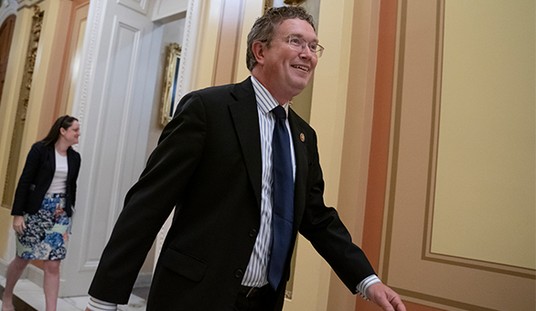To the White House, the capture earlier this month of Osama bin Laden’s son-in-law is another feather in the cap of the administration’s self-touted terrorism fighting chops.
To congressional Republicans, the capture of al-Qaeda propagandist Sulaiman Abu Gaith threatens to go down in history as a giant missed opportunity at best and deadly national security flub at worst — thanks to the “apparent rush” to bring him to trial in a New York federal court.
“There is broad consensus across the United States government, at the Department of Defense, the Department of Justice, the Department of Homeland Security, intelligence community agrees that the best way to protect our national security interests is to prosecute Abu Ghaith in an Article 3 court,” White House spokesman Josh Earnest said when questioned about the method of trial March 8.
“As the president has articulated himself many times, it’s his view that whenever we can use the Article 3 courts to get justice, we’ll do so,” he continued, adding that New York Mayor Michael Bloomberg was not consulted in the decision to try a terrorist blocks from Ground Zero.
Abu Ghaith left Iran earlier this year and crossed into Turkey, where the Turks — who reportedly didn’t want to extradite him to America on the chance that he’d face the death penalty — put the wanted man on a plane to Kuwait and U.S. authorities intercepted him on a stopover in Jordan.
The next day — March 8 — Abu Ghaith was in a New York court to plead not guilty to charges of conspiracy to kill Americans.
“No amount of distance or time will weaken our resolve to bring America’s enemies to justice,” said Attorney General Eric Holder. “To violent extremists who threaten the American people and seek to undermine our way of life, this arrest sends an unmistakable message: There is no corner of the world where you can escape from justice because we will do everything in our power to hold you accountable to the fullest extent of the law.”
The administration was unwilling to send him to the corner of the world housing other al-Qaeda brethren, Guantanamo. Lawmakers are also alarmed at how much information authorities may have not been able to extract from him on the flight back from Jordan. Prosecutors say they have a 22-page statement including conversations from that flight.
On Friday, the chairmen of four House committees — House Intelligence Committee Chairman Mike Rogers (R-Mich.), House Armed Services Committee Chairman Howard P. “Buck” McKeon (R-Calif.), House Foreign Affairs Committee Chairman Ed Royce (R-Calif.), and House Judiciary Chairman Bob Goodlatte (R-Va.) — wrote President Obama to ask why he seemed so intent on tossing away a potentially golden intelligence mine.
“We write to express our grave misgivings about your Administration’s apparent rush to bring senior al-Qa’ida member and spokesman, Sulaiman Bu Ghaith, to the United States to stand trial in criminal court, perhaps missing a key intelligence opportunity,” the congressmen wrote.
Abu Ghaith was close to bin Laden around the time of the Sept. 11, 2001, attacks, fled Afghanistan in 2002, and joined other senior al-Qaeda operative in Iran.
“He appears to be a member of al-Qa’ida’s management council, a shadow of al-Qa’ida leadership body,” the chairmen continued. “…Unfortunately, given the limited length of time Bu Ghaith was in U.S. custody prior to his appearance in court, we have little confidence that intelligence professional had the time necessary to question him seriously about these connections or plans. Even low-level terrorists captured and held by the U.S. military have been subjected to significantly more questioning than Bu Ghaith appears to have been.”
“The failure to provide an adequate mechanism for the United States to acquire sensitive intelligence information from Bu Ghaith prior to Mirandizing him and bringing him to criminal court suggests a fundamental lack of a coherent national security strategy. It seems the Administration’s interagency planning, coordination, and considered policy options were disturbingly limited.”
They requested a briefing with Holder, Director of National Intelligence James Clapper, FBI Director Robert Mueller, and Defense Secretary Chuck Hagel for the chairmen and ranking Democrats on their four committees to get answers to two main questions: How, after such a short time in custody, can the administration know all possible intelligence was gleaned from Abu Ghaith, and “how the administration can best ensure the protection of U.S. interests from continued terrorist threats if our intelligence officers are not allowed sufficient access to high-value detainees.”
“Blinding ourselves to possible intelligence about terrorism threats does not make them go away,” Rogers, McKeon, Royce, and Goodlatte chided Obama.
The GOP was criticizing the administration’s move from the moment bin Laden’s kin landed on U.S. soil.
“Rather than issuing doomsday predictions about sequestration, the president should be notifying Congress that he’s planning a U.S. civilian court trial for a terrorist who took credit for 9/11 and is on video threatening to blow up more U.S. buildings and planes,” Senate Minority Whip John Cornyn (R-Texas) said on March 8.
“The president may not like it, but the fact remains—Gitmo is still up and running. And as long as it is, it’s the only place where we should be detaining America’s most dangerous enemy combatants—period.”
Senate Minority Leader Mitch McConnell (R-Ky.) said Abu Ghaith “is an enemy combatant and should be held in military custody.”
“The decision of the president to import Sulaiman Abu Ghaith into the United States solely for civilian prosecution makes little sense, and reveals, yet again, a stubborn refusal to avoid holding additional terrorists at the secure facility at Guantanamo Bay despite the circumstances. At Guantanamo, he could be held as a detainee and fulsomely and continuously interrogated without having to overcome the objections of his civilian lawyers,” McConnell said.
“From public reports it is clear that Abu Ghaith possesses valuable knowledge of al Qaeda’s activities within Iran. Abu Ghaith has sworn to kill Americans, and he likely possesses information that could prevent harm to America and its allies.”
At the White House, Earnest said “with all due respect to Senator McConnell, that’s not the assessment of the intelligence community.”
“It’s not the assessment of the Department of Justice. It’s not the assessment of the Department of Defense,” the spokesman said of the assertion that Gitmo is the place for the al-Qaeda member. “So he’s certainly welcome to his opinion, but that’s not the assessment of the people who are responsible for protecting the national security of the United States of America.”
Rep. Peter King (R-N.Y.) said he wasn’t concerned about Abu Ghaith possibly being acquitted in criminal court, and said the security risk to Manhattan is less than if professed 9/11 mastermind Khalid Sheikh Mohammed was being tried in federal court — as the administration wanted.
“My concern here is that I believe even though he gave a 22-page statement, when you have someone who was in the bin Laden inner circle, someone who was in Iran for so many years — and there’s a lot more we can gain from him. And I don’t care how good the interrogators are, in the brief a period of time, I don’t think they would have got all out of him that they could have,” King said March 11.
“Also as far as setting a precedent, if someone captured overseas who was in the bin Laden inner circle is going to get a civilian trial, then I don’t know who is going to be tried in a military commission,” he added.
The decision to try Abu Ghaith in civilian court comes as the Obama administration appears eager to quietly let the Guantanamo commissions drag on for an indefinite period of time.
In “an unorthodox development” in the proceedings for accused USS Cole mastermind Ayman al-Rahim al-Nashiri, as his lawyer characterized it, the government filed a motion for a 706 inquiry, under the Rule for Military Commissions, to assess the capacity of the accused Persian Gulf al-Qaeda operations chief to stand trial.
A finding of incapacity to stand trial could be a convenient finding for an administration that might rather indefinitely tuck this death penalty case away — already the forgotten case on an island where the media prefer to show up for the 9/11 trial of Khalid Sheikh Mohammed and his cohorts.
Shortly after the president took office in 2009, the Obama administration withdrew charges against al-Nashiri. New charges were filed in 2011.
Commission proceedings are scheduled to resume April 15. The defense has been petitioning to suspend the competency review “until reasonable safeguards are implemented to protect Mr. al-Nashiri’s confidence.”
One congressman not mentioned in this story told PJM on condition of anonymity that he believes Obama is simply hoping for terror suspects at Guantanamo to die — natural deaths.









Join the conversation as a VIP Member